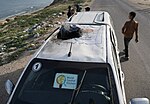Palestine Technical College
The Palestine Technical College (Arabic: كلية فلسطين التقنية, romanized: Kullīyat Filasṭīn al-Tiqniyah) is a college in Deir El-Balah, Gaza Strip, Palestine. The college offers bachelor degree programs and 2-year associate degrees in technical education at the post-secondary level, as well as programmers for different target groups through continuing education. It is a governmental college that was established in 1993. Currently there are more than 1800 student enrolled in the college in 20 diploma programs and 8 B.Sc. programs. The main college campus is located at the city of Deir El-Balah. The college has a branch campus in the north of Gaza City. In the academic year 2015/2016, PTC employed around 200 full time employees of which 120 were academic staff. In 2023 it was used as a shelter for displaced Palestinians during the Israeli invasion of the Gaza Strip and its buildings were damaged by Israeli military strikes.
Excerpt from the Wikipedia article Palestine Technical College (License: CC BY-SA 3.0, Authors).Palestine Technical College
Al-Tejari, Deir el-Balah Deir al-Balah Refugee Camp
Geographical coordinates (GPS) Address Nearby Places Show on map
Geographical coordinates (GPS)
| Latitude | Longitude |
|---|---|
| N 31.41771 ° | E 34.35162 ° |
Address
Al-Tejari
Al-Tejari
Deir el-Balah, Deir al-Balah Refugee Camp
Palestinian Territories
Open on Google Maps






